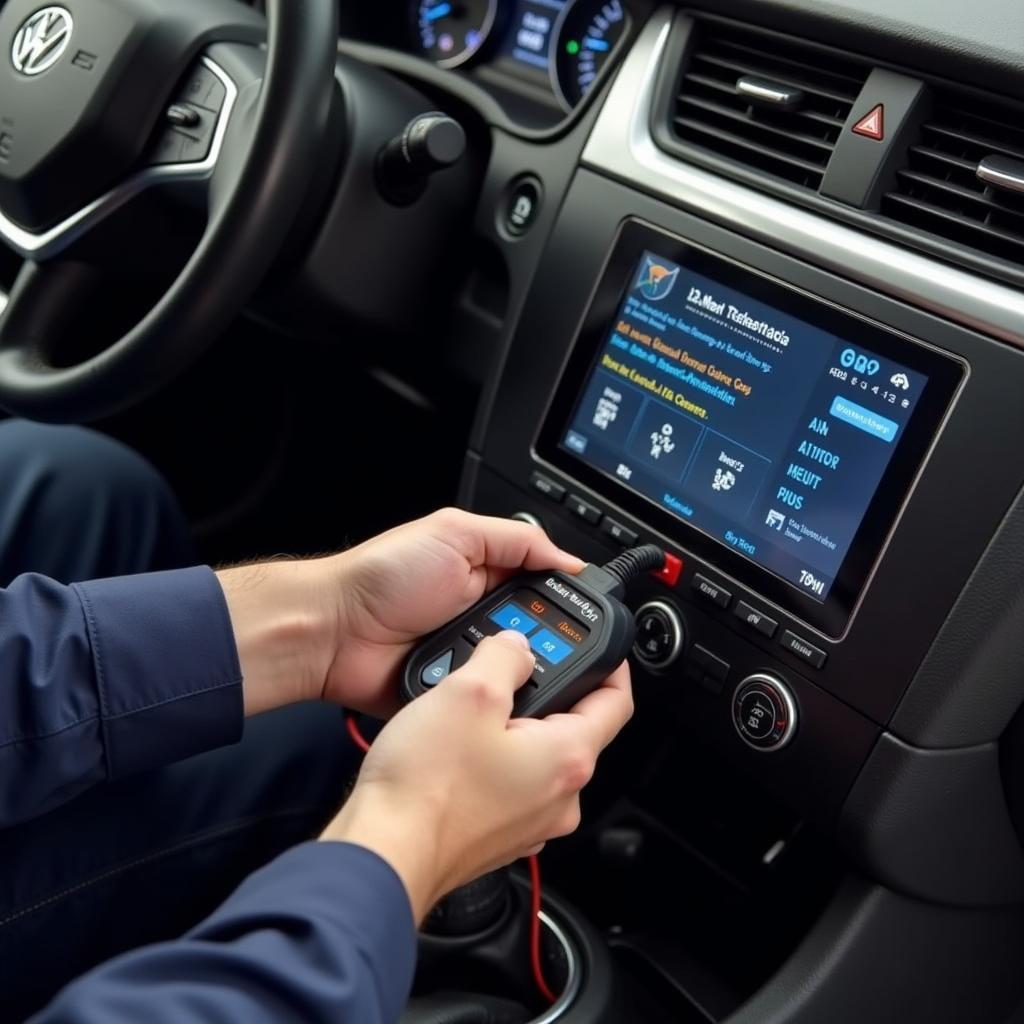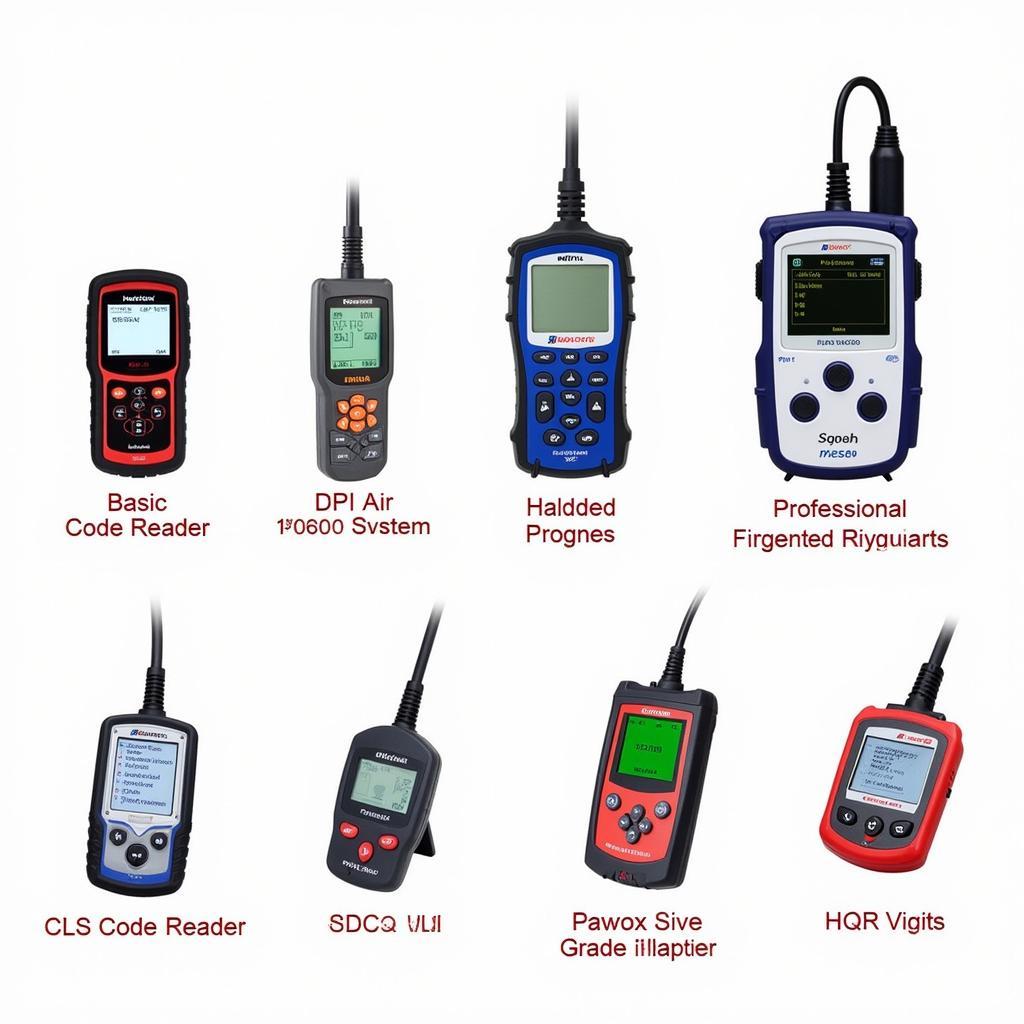A Car Engine Diagnostic Device has become an indispensable tool for mechanics and car enthusiasts alike. With the increasing complexity of modern vehicles, these devices offer a window into the inner workings of your car’s engine, providing valuable insights into its health and performance. But with so many options available, choosing the right diagnostic device can seem daunting. This comprehensive guide explores everything you need to know about car engine diagnostic devices, from their functionality to the key features to consider before purchasing one.
 Mechanic using a car engine diagnostic device to troubleshoot an engine problem
Mechanic using a car engine diagnostic device to troubleshoot an engine problem
Understanding Car Engine Diagnostic Devices
At its core, a car engine diagnostic device is a sophisticated electronic tool that interfaces with your car’s onboard computer system, commonly known as the Engine Control Unit (ECU). The ECU continuously monitors various sensors located throughout the engine and other critical systems. These sensors gather data on parameters such as engine speed, temperature, fuel pressure, oxygen levels, and more.
The diagnostic device retrieves this data from the ECU and presents it in a user-friendly format, allowing mechanics and car owners to identify and diagnose issues effectively. This information can range from simple error codes to detailed live data streams, providing a comprehensive picture of the engine’s health.
Why Are Car Engine Diagnostic Devices Essential?
Before the advent of these devices, diagnosing car problems often involved a lengthy trial-and-error process. Mechanics had to rely on their experience and visual inspections to identify the root cause of an issue, which could be time-consuming and costly for car owners.
 A car engine diagnostic device displaying diagnostic trouble codes
A car engine diagnostic device displaying diagnostic trouble codes
Car engine diagnostic devices have revolutionized car repair and maintenance in several ways:
- Accurate Diagnostics: By providing direct access to the ECU data, these devices pinpoint the exact source of problems, eliminating guesswork and unnecessary repairs.
- Time-Saving: Diagnostic devices drastically reduce the time needed to identify issues, allowing mechanics to work more efficiently and car owners to get back on the road faster.
- Cost-Effective: By enabling precise diagnostics, these devices can save car owners money on unnecessary repairs and replacements.
- Preventative Maintenance: Regularly scanning your car with a diagnostic device allows you to detect potential problems early on, preventing costly breakdowns and extending the life of your vehicle.
Key Features to Consider
Choosing the right car engine diagnostic device depends largely on your specific needs and budget. There are devices designed for professional mechanics, while others cater to DIY enthusiasts.
Here are some essential features to consider:
- Vehicle Compatibility: Ensure the device supports the make, model, and year of your vehicle.
- Types of Codes Read: Check if the device can read and clear both generic (OBD-II) and manufacturer-specific codes for comprehensive diagnostics.
- Live Data Streaming: The ability to view real-time data from various sensors provides valuable insights into the engine’s performance under different conditions.
- Additional Features: Some devices offer advanced features like ABS bleeding, airbag system diagnostics, and battery testing, adding to their versatility.
- User Interface and Display: A user-friendly interface with a clear and easy-to-read display is crucial for efficient use.
- Software Updates: Regular software updates are essential to ensure compatibility with newer car models and access to the latest features.
 Various car engine diagnostic devices for different needs and budgets
Various car engine diagnostic devices for different needs and budgets
Choosing the Right Device for Your Needs
- DIY Enthusiasts: For basic diagnostics and code reading, an affordable OBD-II scanner with a user-friendly interface is a good starting point.
- Home Mechanics: If you perform more in-depth repairs and maintenance, consider a device that offers live data streaming, manufacturer-specific code reading, and some advanced features.
- Professional Mechanics: For comprehensive diagnostics and access to all vehicle systems, a professional-grade scan tool with extensive functionality and regular software updates is essential.
Investing in a diagnostics tester for cars can be invaluable, whether you’re a car enthusiast or a professional mechanic.
Conclusion
In conclusion, a car engine diagnostic device is an indispensable tool in today’s automotive landscape. By providing deep insights into your car’s engine, these devices empower you to make informed decisions about repairs, maintenance, and overall vehicle health. Whether you’re looking for a basic code reader or a comprehensive professional-grade scan tool, understanding the key features and choosing the right device for your needs can save you time, money, and frustration in the long run.
FAQs
1. Are car engine diagnostic devices universal?
While most cars manufactured after 1996 have a standardized OBD-II port, not all diagnostic devices are universally compatible. It’s crucial to ensure the device you choose supports your specific car make, model, and year.
2. Can I use a car engine diagnostic device to reset my check engine light?
Yes, most car engine diagnostic devices allow you to read and clear diagnostic trouble codes, which includes resetting the check engine light. However, it’s essential to address the underlying issue that triggered the light in the first place.
3. Do I need a professional mechanic to use a car engine diagnostic device?
Many car engine diagnostic devices, especially entry-level ones, are designed to be user-friendly and accessible to DIY enthusiasts. However, interpreting the data and understanding the complexities of car repair often require some level of mechanical knowledge.
4. How often should I scan my car with a diagnostic device?
It’s generally recommended to scan your car with a diagnostic device at least once a year or whenever you experience any unusual performance issues.
5. Can a car engine diagnostic device diagnose problems with other vehicle systems?
Some advanced diagnostic devices can access and diagnose issues with other vehicle systems like ABS, airbags, and transmission, depending on the device’s capabilities and the car’s make and model.
Additional Resources
For more information on car diagnostics and related services, you can explore our website:
Need help diagnosing your car’s engine? Contact our expert team via WhatsApp: +1(641)206-8880 or Email: [email protected]. We’re available 24/7 to assist you.

Leave a Reply